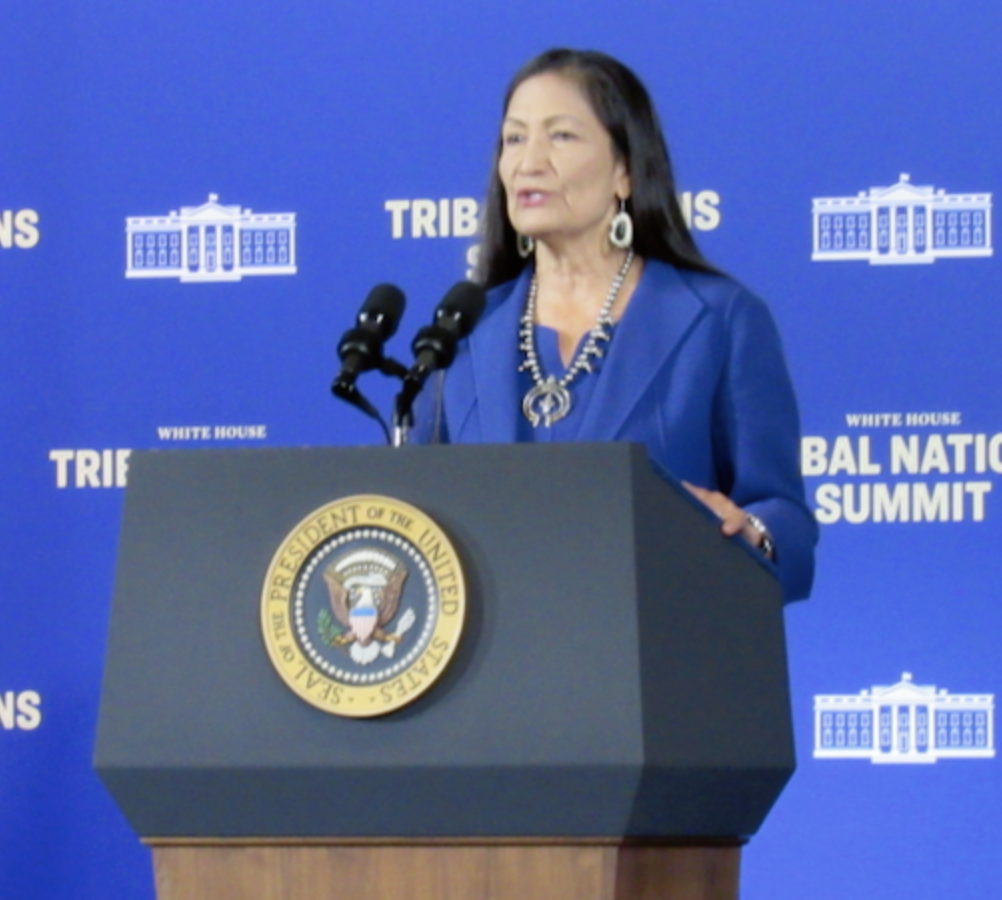
- Details
- By Darren Thompson
WASHINGTON— Yesterday, the Department of Interior (DOI) announced the launching of a new program for federally recognized tribes seeking to relocate as a result of climate change.
Secretary of the Interior Deb Haaland initially announced $135 million in funding at the 2022 White House Tribal Leaders Summit. The funds will assist 11 Tribes in advancing relocation efforts and adaption planning.
“As part of the federal government’s treaty and trust responsibility to protect Tribal sovereignty and revitalize tribal communities, we must safeguard Indian Country from the intensifying and unique impacts of climate change,” said Secretary of the Interior Deb Haaland in a statement on Nov. 30. “Helping these communities move to safety on their homelands is one of the most important climate-related investments we could make in Indian Country.”
The Voluntary Community-Driven Relocation program is led by the DOI and will assist Tribal communities severely impacted by climate-related environmental threats. The funds have been allocated through the Bipartisan Infrastructure Law and Inflation Reduction Act, with additional support to be provided by the Federal Emergency Management Administration (FEMA) and the Denali Commission.
The investments announced yesterday will support two types of grants: relocation grants for severely impacted communities currently ready to implement relocation and manage retreat plans; and planning grants for communities that need additional planning support in evaluating climate threats and mitigation strategies.
The DOI will provide $25 million each to the Quinault Indian Nation (Wash.), Newton Village (Alaska), and the Native Village of Napakiak (Alaska). The Interior announced that each community is at high risk of erosion, and Napakiak is predicted to lose most of its critical infrastructure by 2030. FEMA is awarding approximately $17.7 million to assist the three communities in their efforts to acquire, demolish and build new infrastructure out of harm’s way.
DOI also announced that eight additional communities will receive $5 million each to assist with further planning to prepare for relocation or increased climate resilience measures. According to the DOI, these communities face varied climate risks, including coastal and riverine erosion, permafrost degradation, wildfire, flooding, food insecurity, sea level rise, hurricane impacts, potential levee failure and drought. Planning grants of $5 million each are being awarded to the Native Village of Point Lay (Alaska); Huslia Village (Alaska); Native Village of Fort Yukon (Alaska); Native Village of Nelson Lagoon (Alaska); Havasupai Tribe (Arizona); Yurok Tribe (California); Chitimacha Tribe (Louisiana); and Passamaquoddy Indian Tribe (Maine).
A 2020 BIA study estimated that up to $5 billion will be needed over the next 50 years to address Tribal relocation infrastructure needs in response to climate change impacts. The Bipartisan Infrastructure Law provides $466 million to the BIA over five years, including $216 million for climate resilience programs, provided as $43.2 million annually for five years. Of that funding, $130 million is for community relocation and $86 million is for Tribal climate resilience and adaptation projects.
More Stories Like This
Trump signs law that revokes some limits on drilling in Alaska’s National Petroleum ReserveSouthern Sierra Miwuk Nation Gets 900-Acres ofLand Back
Chilkat Indian Village Tells New Palmer Mine Owners They Are “Not Welcome” in Chilkat Valley
Tribes, Coastal Group Ask Army Corps to Revoke Permit for Texas Export Terminal
Michigan Tribes Tell Supreme Court: Don’t Bail Out Enbridge
Help us defend tribal sovereignty.
At Native News Online, our mission is rooted in telling the stories that strengthen sovereignty and uplift Indigenous voices — not just at year’s end, but every single day.
Because of your generosity last year, we were able to keep our reporters on the ground in tribal communities, at national gatherings and in the halls of Congress — covering the issues that matter most to Indian Country: sovereignty, culture, education, health and economic opportunity.
That support sustained us through a tough year in 2025. Now, as we look to the year ahead, we need your help right now to ensure warrior journalism remains strong — reporting that defends tribal sovereignty, amplifies Native truth, and holds power accountable.
 The stakes couldn't be higher. Your support keeps Native voices heard, Native stories told and Native sovereignty defended.
The stakes couldn't be higher. Your support keeps Native voices heard, Native stories told and Native sovereignty defended.
Stand with Warrior Journalism today.
Levi Rickert (Potawatomi), Editor & Publisher

